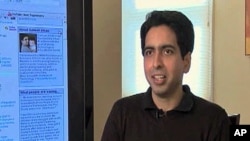A 33-year-old financial analyst in California recently quit his job to devote himself to an unpaid job teaching math on the Internet, and his lessons are reaching almost 100,000 people a month. In this week's edition of Making a Difference, we introduce you to Salman Khan and his Khan Academy, and the difference they make for people who struggle to learn math.
Salman Khan's disembodied voice is heard every day - by tens of thousands of students around the world who are hungry for help learning math. He has posted 1,200 lessons on YouTube...lessons that appear on an electronic blackboard, and range from basic addition and advanced calculus to science and finance. And they are free.
"Introduction to Trigonometry is where I teach people about the trig functions," he explained. "This is one of the more popular videos. This has 179,000 views. And you know this is just what sine, cosine, and tangent are.
Salman Khan lives in California's Silicon Valley, with his wife, a rheumatologist in training at Stanford University, and their new baby. He got the idea for Khan Academy four years ago, when he taught a young cousin how to convert kilograms to grams. With Khan's help, the cousin got good at math, and Khan launched a new career.
Now, Khan records his lessons from a converted closet in the back of his bedroom. He never goes on camera.
"It kind of feels like my voice in their head. You're looking at it and feels like someone's over your shoulder talking in your ear, as opposed to someone at the blackboard, that's distant from you," he said.
When the all-girl Castilleja School in Palo Alto, California invited Khan to speak in person - he immediately connected to the students there.
The concept of short lessons that can be played over and over again attracted high school senior Bridget Meaney. She says she had trouble with seventh grade algebra. "I think the teachers are good, but they can't go at a pace that's perfect for everyone," she said. "But I like the concept of knowing something in class but then going back and pressing pause or rewind and actually getting a deeper understand of it."
Originally, Khan kept his lessons short because of YouTube restrictions. Now, he thinks short is better.
"I've gotten researchers telling me that you don't realize 10 minutes [we've done studies] is how long someone can have a high level of concentration. And anything beyond that you kind of lose it. I think that we've all had that experience sitting in college where you can be with the professor for about 10 or 15 minutes and then you kind of lose it," he said.
For Khan, teaching math, science, and finance is just the beginning. He says he's ready to expand his YouTube site to include other subjects as well.




